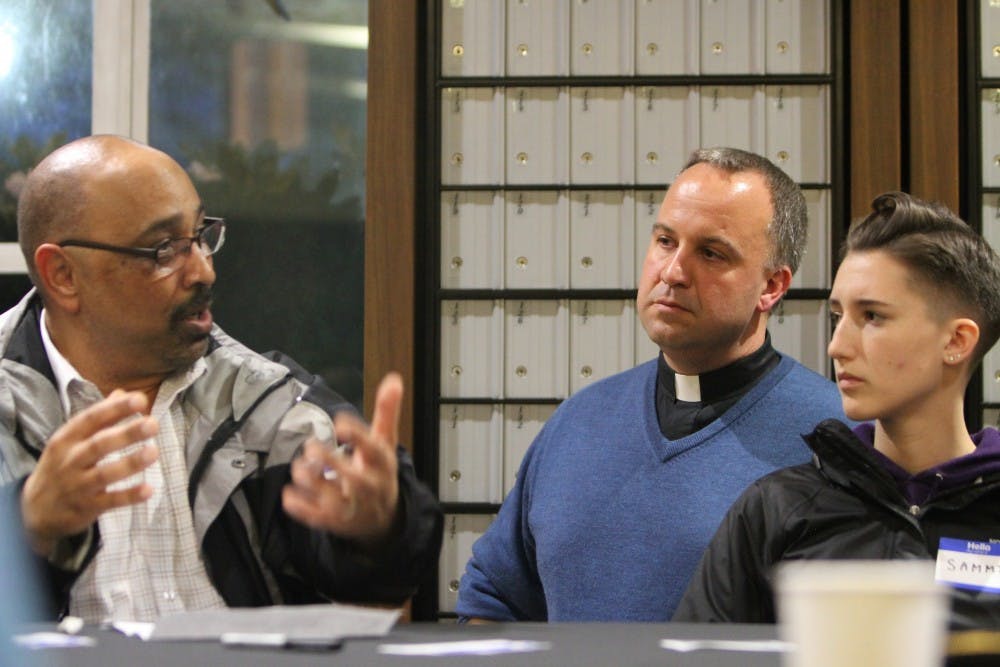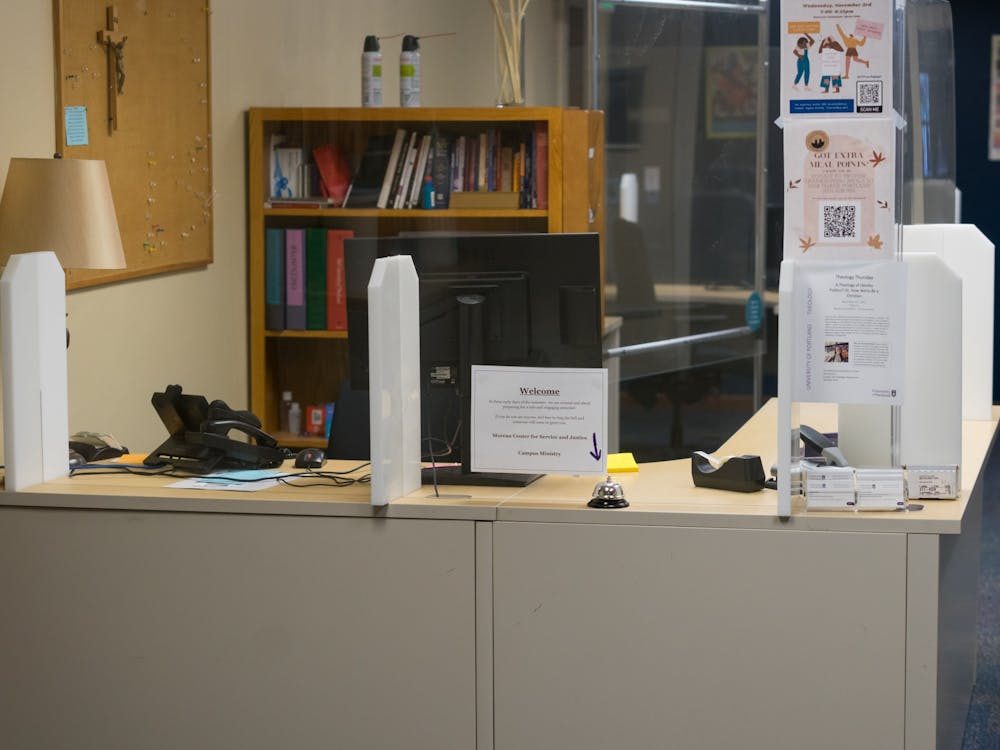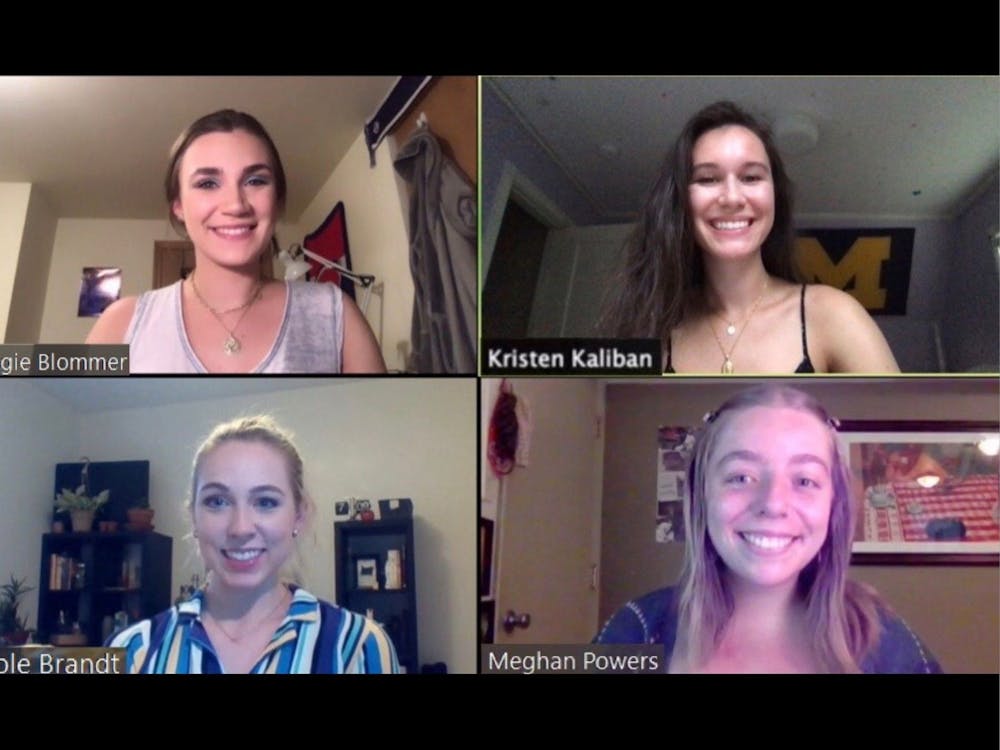Nearly 200 people — students, faculty and staff — packed Mehling Ballroom Tuesday night to discuss racial inclusion, an often uncomfortable topic at a university where one percent of the student body and zero percent of the upper-administration is African-American.
The event, hosted by the Presidential Advisory Committee on Inclusion (PACOI), left many participants encouraged by attendance, yet confused and disappointed that all of the event’s featured speakers were white.
In small groups, participants were asked to grapple with three questions: What are things that UP as a community is doing well around racial inclusion? What are things that UP as a community could improve around racial inclusion? What are action steps that UP as a community can take to be more inclusive?
“To be honest, this is the first thing I’ve seen while I’ve been here that is racial inclusion-specified,” junior Nina Sackett said.
While small groups mentioned several areas of success in terms of racial inclusion such as conversations prompted through Beacon articles and certain professors including cultural competency in their courses, the majority of discussion centered around what the UP community can be doing better.
Participants in the small groups made suggestions ranging from adding cultural competency sessions to orientation and having spaces for diverse religious practices.
But there were two common themes in most of the conversations: First, going beyond “inclusion” to actually diversifying the community both in terms of hiring for faculty, staff and administration and recruiting students from a wider variety of backgrounds.

“I would really like to have faculty that’s not majority white,” Christian Wells, a black sophomore sociology major, said. “There’s no black faculty that I can go to for advice in my field, especially when I do research, there’s no black faculty.”
And second, adding a class devoted to cultural understanding and competency to the University’s core requirements.
“I think (a core class) needs to be mandatory. Especially in this day and age. It would only be beneficial,” Sackett said.
“I think especially at a predominately white school, since the majority hasn’t been necessarily exposed to the experiences of people in different races, it would be beneficial to let them be exposed to that,” sophomore Sabrina Bernaldo-Olmedo said.
The event’s featured speakers shared times when they felt they either combated racism or perpetuated it — and what they’ve learned since. But there was an almost palpable question hanging in the air throughout the room: At an event intended to address diversity, why were all the featured speakers white?
“I can’t think of a professor who isn’t white off the top of my head,” junior sociology major Zeke Pralle said. “I think only hearing white voices talking to us, up on stage, is echoing what we hear in the classroom.”
But co-chair of the event and student member of the PACOI Khalid Osman closed the event by assuring the crowd that this was an intentional choice.

“Students of color have been speaking out about this to each other, and I hear from students of color all the time,” Osman said. “What we wanted to know is, the people not speaking, the usual suspects to say, ‘Hey, I made a mistake,’ or, ‘Hey, I did something right’ ... We want to create momentum. We want more of these conversations to happen. We want this to be just the start.”
Many participants expressed hope that the event, an effort coordinated by various groups across campus — Presidential Advisory Committee on Inclusion, Black Student Union, Black Lives Matter, the Student Association of Social Workers and the Office of Student Activities — would be just a stepping stone in improving racial inclusion on campus.
“Basically tonight has the potential to take Armstrong-size steps on a journey that will not be completed in our time at the University of Portland. That is a fact,” sophomore Henry Hark, one of the event’s featured speakers, said.
University President Fr. Mark Poorman attended and gave the event his stamp of approval.
“Scripture says we should be treating each other as if no one were strangers, as if everyone were welcome,” Poorman said.
According to co-chair of the PACOI Fr. Gerry Olinger, the committee will compile participants’ notes from the event into a spreadsheet to use in its discussions.
“The feedback will help inform the work of the PACOI in future years,” Olinger said. “We’ll have an opportunity to start analyzing that information over the summer. It will really, I think, become a guiding document."








